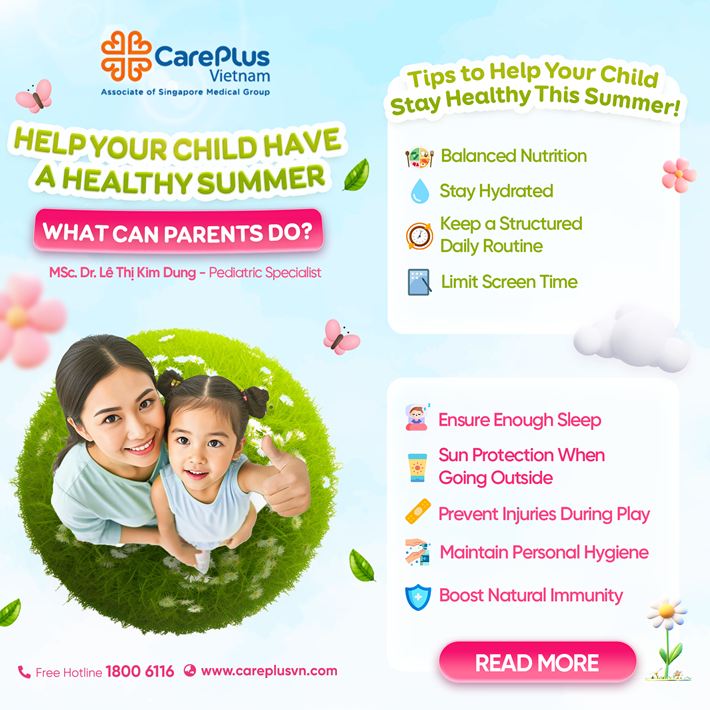WHAT SHOULD PARENTS DO TO KEEP THEIR CHILDREN HEALTHY DURING SUMMER?

6/27/2025 10:03:52 AM
WHAT SHOULD PARENTS DO TO KEEP THEIR CHILDREN HEALTHY DURING SUMMER?
Summer is here—no more homework, and children are excited to enjoy their free time, travel with family, and explore the world around them. However, disrupted routines, frequent outings, and hot, humid weather can affect children’s health and increase their risk of illness.
During summer, kids are more prone to:
-
Respiratory infections (e.g., rhinitis, allergic rhinitis, tonsillitis, bronchiolitis, pneumonia)
-
Digestive disorders (e.g., vomiting, diarrhea)
-
Heat-related symptoms like high fever, rashes, headaches, fatigue, and poor appetite
-
Seasonal illnesses such as dengue fever, hand-foot-mouth disease, measles, chickenpox, and influenza
So, how can parents help their child stay healthy this summer? Here are 8 essential tips:
1. Nutrition and Eating Habits
-
Ensure your child has a well-balanced diet with all essential food groups to support growth. Prioritize foods rich in vitamins A, C, D, calcium, iron, and omega-3, while limiting sugary and fatty foods.
-
Even during school breaks, try to maintain regular mealtimes—especially breakfast. Avoid letting your child oversleep and skip morning meals.
-
Children tend to snack more at home or during trips. To avoid excessive unhealthy snacking, don’t keep too many sweets or junk food in the house. Instead, stock up on healthy snacks like:
-
Fresh fruits (avocado, ripe mango, banana, papaya, apples, strawberries)
-
Yogurt with fruit
-
Fruit smoothies
-
Nuts (cashews, walnuts, peanuts)
-
Homemade popsicles or ice cream for both nutrition and hygiene
-
Encourage your child to help with meal prep, grocery shopping, or cooking. It’s a fun way to teach them about healthy food choices and keep them active.
-
When going on outings, pack home-cooked meals, fresh fruits, and clean drinking water to avoid greasy, unhygienic street food and reduce the risk of digestive issues or food poisoning.
2. Stay Hydrated
-
Children’s bodies don’t adapt to temperature changes as quickly as adults. Encourage them to drink enough water throughout the day to stay cool and support immunity.
-
For infants and young toddlers, ensure they are breastfed adequately—breast milk contains vital nutrients and antibodies that protect against infections.
-
Older children should drink vitamin- and mineral-rich fluids like fresh fruit juices, orange juice, coconut water, and boiled-and-cooled water.
3. Maintain a Daily Routine
-
Without a structured schedule, children may get bored or sluggish. Create a daily summer routine that keeps them active and engaged.
-
Consider enrolling them in day camps, sports (e.g., swimming, soccer, basketball, aerobics), or creative classes (e.g., drawing, music, group activities) based on their interests.
-
Schedule family activities like walks, bike rides, swimming, or ball games. Aim for at least 60 minutes of physical activity every day.
4. Limit Screen Time
-
Too much screen time increases the risk of unhealthy weight gain.
-
The American Academy of Pediatrics recommends:
-
Ages 2–5: No more than 1 hour per day
-
Older children: No more than 2 hours per day
-
While it’s unrealistic to ban screens completely, guide your child to watch educational and age-appropriate content.
5. Prioritize Sleep
-
Even during vacation, maintaining a consistent sleep schedule is important. When children sleep well, they have more energy for physical activity and play.
-
Both oversleeping and lack of sleep can lead to fatigue, poor concentration, reduced immunity, and cravings for unhealthy food.
Recommended daily sleep duration:
-
Ages 6–13: 9–11 hours
-
Ages 14–17: 8–10 hours
Tips to support good sleep:
-
Set a consistent bedtime
-
Ensure your child gets enough activity during the day
-
Avoid screens (TV, phone, tablet, computer) at least 1 hour before bed, as blue light interferes with melatonin, the sleep hormone. Plus, engaging screen content can make it harder for children to wind down.
6. Practice Sun Safety
-
Sunlight helps children produce vitamin D, essential for strong bones and healthy growth. It also stimulates serotonin, a hormone that boosts mood and well-being.
-
However, excessive sun exposure can lead to sunburn and increase the long-term risk of skin cancer. Always apply age-appropriate sunscreen when your child is outdoors.
-
Use sunscreen 30 minutes before sun exposure, and reapply every 2 hours. Test it on a small patch of your child’s skin (such as the wrist) before full application.
-
Avoid spraying sunscreen directly on your child’s skin. Instead, spray onto your hands and gently apply it.
7. Prevent Injuries
-
Summer playtime often leads to increased injuries. Parents should:
-
Check that playgrounds have soft, well-maintained surfaces.
-
Supervise young children, especially near stairs, slides, or climbing structures.
-
Ensure proper protective gear for all activities:
-
Life jackets for water play or boating
-
Helmets for biking
-
Pads for rollerblading or skating
-
At home, keep children away from hot surfaces, microwaves, and electrical outlets.
-
For water activities:
-
Teach swimming and water safety skills
-
Always use life jackets
-
Never leave children unsupervised near water
-
Learn CPR (cardiopulmonary resuscitation)—a life-saving skill every parent should know.
8. Personal Hygiene and Immunity
-
Hot and humid weather, along with crowded travel destinations, increases the risk of infections such as respiratory illnesses, diarrhea, hand-foot-mouth disease, chickenpox, and more. Help protect your child by:
-
Teaching good personal hygiene—like washing hands before meals and after coughing or sneezing
-
Ensuring food safety when eating out
-
Preventing mosquito-borne diseases by clearing stagnant water, cleaning drains, cutting bushes, and using mosquito nets
-
Following the recommended vaccination schedule by the Ministry of Health, especially for chickenpox, measles, mumps, rubella, and seasonal flu
-
By following these tips, parents can help their children enjoy a safe, fun, and healthy summer—full of exploration, joy, and growth.